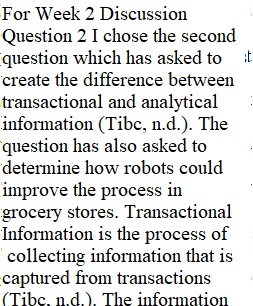


Q Please refer to Chapter 2's Closing Case 2 (Robots Took My Job, pg. 98) and answer any ONE of the questions below in your initial thread before Wednesday. Then, before the end of Sunday, interact with at least TWO other classmates by either asking probing question(s), agreeing with their answers, or offering alternative points of view. Either way, your replies must be substantive and through-provoking to earn full credit for your participation. Questions: 1. Define the three primary types of decision-making systems and how robots in the workplace could affect each. 2. Describe the difference between transactional and analytical information, and determine how robots could improve the process for gathering and manipulating each type for a grocery store such as Safeway. 3. Illustrate the business process model used by a robot to perform an analysis on a patient with a cold. 4. Explain business process reengineering and how robots might dramatically change the current sales process. 5. Formulate different metrics that a personal trainer robot for a fitness club could provide a customer. 6. Argue for or against the following statement: Robots are better than humans in all business capacities.
View Related Questions